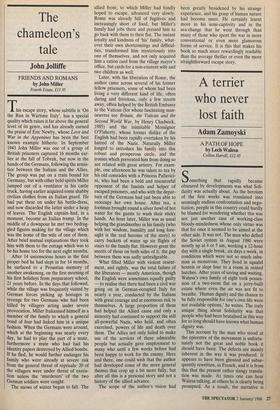The chameleon's tale
John Jolliffe
FRIENDS AND ROMANS by John Miller Fourth Estate, f13.95 This escape story, whose subtitle is 'On the Run in Wartime Italy', has a special quality which raises it far above the general level of its genre, and has already earned the praise of Eric Newby, whose Love and War in the Appenines has been the best known example hitherto. In September 1943 John Miller was one of a group of British prisoners captured 16 months ear- lier at the fall of Tobruk, but now in the hands of the Germans, following the armis- tice between the Italians and the Allies. The group was put on a train bound for Germany, but with other bold spirits Miller jumped out of a ventilator in his cattle truck, having earlier acquired some shabby civilian clothes from an Italian guard. He had put these on under his battle-dress, and now discarded the latter under a heap of leaves. The English captain 'had, in a moment, become an Italian tramp. In the middle of a downpour he met two bedrag- gled figures making for the village which was the home of the wife of one of them. After brief mutual explanations they took him with them to the cottage which was to be his home too for the next eight months.
After 14 unconscious hours in the first proper bed he had slept in for 14 months, he surfaced to a Proustian memory of another awakening, on the first morning of his first holidays from preparatory school, 21 years before. In the days that followed, while the village was frequently visited by German forces picking up hostages in revenge for two Germans who had been killed by villagers acting under severe provocation, Miller Italianised himself as a member of the family to which a general bond of fear had linked him in a unique fashion. When the Germans were around, which at the beginning was nearly every day, he had to play the part of a mute, furthermore a mute who had had his identity papers destroyed by Allied bombs. If he fled, he would further endanger his family who were already at severe risk from the general threat of reprisals: 20 of the villagers were under threat of execu- tion unless the 'murderers' of the two German soldiers were caught.
The snows of winter began to fall. The allied front, to which Miller had fondly hoped to escape, advanced very slowly.
Rome was already full of fugitives and increasingly short of food, but Miller's family had jobs there and pressed him to go back with them to their flat. The instant loyalty and kindness of 'his' family, what- ever their own shortcomings and difficul- ties, transformed him mysteriously into one of themselves, and not only acquired him a ration card from the village mayor's office, but cards for a non-existent wife and two children as well.
Later, with the liberation of Rome, the author came across several of his former fellow prisoners, some of whom had been living a very different kind of life, often daring and frivolous, only a few streets away, often helped by the British Embassy to the Vatican (for whose fascinating man- oeuvres see Britain, the Vatican and the Second World War, by Henry Chadwick, .1985) and the inimitable Monsignor O'Flaherty, whose former dislike of the English had been rapidly overtaken by his hatred of the Nazis. Naturally Miller longed to introduce his family into this robust and prosperous circle, and the ironies which prevented him from doing so are related with great artistry. For exam- ple, one afternoon he was taken to tea by his old comrades with a Princess Pallavici- ni, who had been a bold and resourceful opponent of the fascists and helper of escaped prisoners, and who with the depar- ture of the Germans had just been able to reoccupy her own house. After tea, a footman brought round a silver bowl of hot water for the guests to wash their sticky hands. An hour later, Miller was as usual helping the grandmother in his family (who with her wisdom, humility and long fore- sight is the real heroine of the story) to carry buckets of water up six flights of stairs to the family flat. However great the merits of those on both sides of it, the gap between them was sadly unbridgeable.
What filled Miller with violent resent- ment, and rightly, was the total failure of the liberators — mostly American, though the English were sometimes equally guilty — to realise that there had been a civil war going on in German-occupied Italy for nearly a year, conducted by the Italians with great courage and at enormous risk to themselves. A large proportion of them had helped the Allied cause and only a minority had continued to support the still all-powerful Nazis, who held, and often exercised, powers of life and death over them. The Allies not only failed to make use of the services of these admirable people but actually gave employment to many who until a few weeks before had been happy to work for the enemy. Here and there, one could wish that the author had developed some of the more general themes that crop up a bit more fully, but after all this is a personal story and not a history of the allied advance.
The scope of the author's vision had been greatly broadened by his strange experience, and his grasp of human nature had become surer. He certainly learnt more in his semi-captivity and in the sea-change that he went through than many of those who spent the war in more conventional or even more glamorous forms of service. It is this that makes his book so much more rewardingly readable than the average thriller or even the more straightforward escape story.










































 Previous page
Previous page